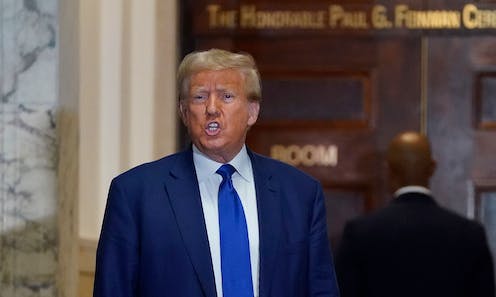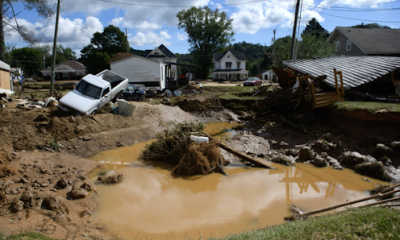
Donald Trump attends his civil fraud trial in New York City on Oct. 25, 2023. Timothy A. Clary/AFP via Getty Images
Former President Donald Trump’s rhetoric has regularly bordered on the incitement of violence. Lately, however, it has become even more violent. Yet both the press and the public have largely just shrugged their shoulders.
As a political philosopher who studies extremism, I believe people should be more worried about this.
Mark Milley, the outgoing chairman of the joint chiefs of staff, is guilty of “treason,” Trump said in September 2023, just for reassuring the Chinese that the U.S. had no plans to attack in the waning days of the Trump administration. And for this, Trump says, Milley deserves death.
And back in April, Trump said that his indictment by Manhattan District Attorney Alvin Bragg would result in “death and destruction.” Then, in early October, Trump urged people to “go after” Letitia James, the New York attorney general who filed suit against him for business fraud.
Trump’s prior rhetoric is also now on record as having inspired many of those convicted to engage in insurrection at the U.S. Capitol on Jan. 6, 2021.
But it is not just government officials whom Trump suggests be targeted for extrajudicial killings. Mere shoplifters should be killed too. “Very simply, if you rob a store, you can fully expect to be shot as you are leaving,” Trump said to cheers at the California Republican Party convention in September.
Trump supporters storm the U.S. Capitol on Jan. 6, 2021.
Brent Stirton via Getty Images News
More than crazy bluster
This rhetoric may seem like crazy bluster, which is no doubt why many people appear prepared to ignore it. But put in its historical context, what Trump is doing is echoing views that are part of a long tradition of illiberal and outright fascist thought. For fascists have always seen the use of violence as a virtue, not a vice.
First, this is the natural result of the way that fascist communities define themselves. According to Carl Schmitt, a prominent Nazi and for a time the official legal theorist of the party under Adolf Hitler, one builds and maintains a community by identifying and vilifying its enemies. And in this kind of highly polarized environment, the threat of violence always hangs in the air.
Second, among fascists, machismo is much admired. Former Brazilian President Jair Bolsonaro, whose own outrageous rhetoric has also encouraged violent behavior by his supporters, simply “beamed” when Russian President Vladimir Putin praised him for his masculinity.
Trump often acts as a sycophant for Putin too, and machismo also is a big part of Trump’s own public persona.
Third, fascists are obsessed with purity. They long for a world where they can live among their own racial, ethnic, religious and ideological kind on land they view as exclusively theirs.
But in the real world, people are too intermixed for this to occur naturally. True purity of community is an aspiration that can be made real only through violence and subjugation. Hence the Holocaust,genocide and ethnic cleansing, and other more limited attacks on minority and immigrant populations.
Violence as noble and intoxicating
Fascists, then, see violence as noble and intoxicating. For example, Julius Evola, a far-right intellectual active in Italy from 1920 to 1970 and the author, among other things, of “Fascism Viewed from the Right” and “A Handbook for Right-Wing Youth,” writes that violence “offers man the opportunity to awaken the hero that sleeps within him.”
Today, Evola is a favorite of the alt-right, and he suggests that a hero’s death is preferable to a life built on liberal compromise. “The moment the individual succeeds in living as a hero,” Evola writes, “even if it is the final moment of his earthly life, weighs infinitely more on the scale of values than a protracted existence consuming monotonously among the trivialities of cities.”
The ultraconservative Catholic authoritarian and opponent of the French Revolution Joseph de Maistre, who is recognized as one of the intellectual forefathers of fascism, goes even further.
“The whole earth, perpetually steeped in blood, is nothing but a vast altar upon which all that is living must be sacrificed without end, without measure, without pause, until the consummation of things, until evil is extinct, until the death of death,” Maistre writes. Indeed, without an executioner, the man who kills other men, Maistre claims society could not exist. For violence is necessary to satisfy “men’s natural desire to be destructive,” he writes; it leaves them feeling “exalted and fulfilled.”
Patriot Front – labeled a ‘white supremacist group’ by the Anti-Defamation League – marches in Washington, D.C., in May 2023.
Nathan Posner/Anadolu Agency via Getty Images
Social disruption and destruction
These comments make clear that fascists see violence as something to be used for more than just personal retribution and intimidation. It is to be used to create wider social disruption and destruction. Not only are individuals to be subject to attack, but institutions and norms as well.
Consider “The Fourth Turning: An American Prophecy,” a work by two amateur historians popular on the far right.
The book is actually a restatement of Evola’s theory of historical regression, set forth in his “Revolt against the Modern World.”
The idea is that history moves in cycles, the first one being the best and each one thereafter representing a further decline. The fourth cycle is the worst, and it ends only when all existing social institutions are destroyed. This, in turn, is an application of the philosopher Friedrich Nietzsche’s idea that “one can build only in a space which has been previously razed to the ground.”
Then history will reset and cycle once again.
Trump’s former adviser Steve Bannon admires these ideas so much he made a movie about them.
Trump appears to embrace these ideas too. “When the economy crashes, when the country goes to total hell, and everything is a disaster, then you’ll have riots to go back to where we used to be, when we were great,” he says.
Viewed in this context, not taking Trump’s violent rhetoric more seriously seems dangerous indeed.
Mark R. Reiff is a registered Democrat. He does not work for, consult, own shares in, or receive funding from any company or organization that would benefit from this article, and has disclosed no other relevant affiliations beyond his academic appointment.
Advertisement

Advertisement
Contact Us
If you would like to place dofollow backlinks in our website or paid content reach out to info@qhubonews.com











